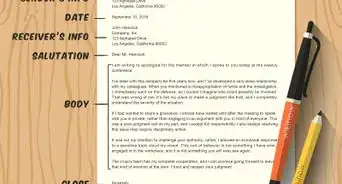This article was co-authored by wikiHow staff writer, Sophia Latorre. Sophia Latorre is a Content Manager on the wikiHow team. Before joining wikiHow, Sophia worked as a technical editor and was published in six International Energy Agency (IEA) Wind Annual Reports. Now, she writes, edits, and reviews articles for the wikiHow Content Team, working to make the content as helpful as possible for readers worldwide. Sophia holds a BA in English from Colorado State University.
This article has been viewed 136,046 times.
Learn more...
Nomination letters are used to help committees choose individuals to receive an award, position, scholarship, or some other prize. Research both the nomination and your nominee before you write a letter. Include specific details that show why this person deserves to win. If you remain focused, detailed, and organized, your nomination will be sure to stand out from the others.
Steps
Researching the Nomination and Nominee
-
1Learn all you can about the nomination. Nominations can be for a position, scholarship, or award. It is important to learn as much as you can about it so you can create a stronger case for your nominee.[1] Consider things such as:
- What are the criteria for nominating someone?
- What characteristics are the reviewers looking for?
- How will they select the winner?
- Who has won in the past?
- When is the deadline?
-
2Identify the person you would like to nominate. You may already have an individual in mind for this nomination. If not, brainstorm potential nominees. List individuals who have the qualities the reviewers seek to reward.Advertisement
-
3Get a copy of the nominee’s resume or CV. This might provide you with information about their background that you do not already know. It also gives you a starting place for writing the letter. Look at their education, job experience, awards or honors received, and special skills or talents.
-
4Talk to the nominee to learn more about them. Though you may know the nominee in a professional capacity, speaking with them personally can give you additional material to include in the letter. They may surprise you with new information about their background and experience.
- If you don’t want the person to know you’re nominating them, just have a casual chat without mentioning the nomination. If you think that could give you away, skip this step and talk to one of their family members instead, making it clear you want to keep the nomination a secret for now.
-
5Speak to the nominee’s friends, classmates, or colleagues. The nominee’s friends and acquaintances can provide you with further information about them. You can talk with them in person or request that they email you. Ask if they have a story or example they can share.
- For instance, say, “I’m nominating Jordan for a scholarship. Do you have any information or examples that explain why he’d be a great candidate?”
Drafting the Letter
-
1Choose a theme. It’s a good idea to organize your nomination letter around one big idea. This helps the reviewers follow along. It also helps them remember your nomination because everything will point back to a single theme instead of a lot of disconnected information.
- If you’re nominating someone for employee of the month, the theme of your letter could focus on how the nominee helps others in the workplace.
-
2Start with a greeting. Begin your letter with a personal greeting to the people who will be reading it. If you aren’t sure who is on the committee, research it on the Internet or call the organization and ask. Be sure you spell the name properly to avoid embarrassment.[2]
- As a last resort, begin your letter with “To whom it may concern.”
-
3Explain your connection to the nominee. Share how you know the person you are nominating, and include a brief anecdote about them. You should also directly state that you are nominating this person for an award.[3]
- For example, say “While teaching second grade together, I learned that Mary Drake is a shining example of patience and kindness, which is why I’m nominating her for the Heartwarmer Award.”
-
4Compile a list of reasons that your nominee should be selected. Reasons could include examples, stories, illustrations, and statistics about an individual's work. You should be as specific as possible. Bring this person to life in order to help the reviewers visualize this individual.[4]
- For example, write “Edward has received five letters of recommendation from customers since joining our company and his customer feedback performance is the highest within the estate.”
- You could also say something like, “Even though he didn’t have to, Dan used his own money to purchase art supplies for the after-school program.”
-
5Share your faith in the candidate. Explain to the committee that you have the utmost faith in this person to continue to do well. Make it clear that they are an excellent candidate for the award.
- For example, say “Susan continues to strive for excellence and maintains a 4.0 GPA, which is one of the reasons I know she deserves this scholarship.”
-
6Provide your contact information. Let the reviewers know they can contact you if they need additional information or if they have questions. Include your full name, title or position, email address, and phone number.[5]
- Be sure to type your name and also leave room to add your signature.
Editing and Submitting the Letter
-
1Ensure you have met the criteria. It’s a good idea to read over the details of the award so you can make sure your letter meets the nomination criteria. Remove unnecessary or inapplicable material, as well as anything that doesn’t fit the theme you have chosen. If you haven’t followed the guidelines, your nominee may be disqualified.
-
2Review your writing skills. Make sure you have varied the sentence structure, formatted your paper into paragraphs, and used appealing language. Also check to make sure you have used concrete examples.[6]
- The more specific and detailed you can be when sharing a particular story, the better your chances of the review committee remembering your nomination. Keep the examples concise, but detailed.
-
3Proofread your nomination letter. Read your letter and check for spelling and grammatical errors. Ensure that the format is consistent and clean. Ask others to look it over, as well. They will be able to provide more objective feedback, as well as a different perspective.[7]
- Make sure you spelled the nominee's name correctly and listed their appropriate title. Spelling the name or title wrong is embarrassing for you and the nominee, and it gives the deciding body the impression that you don't know the nominee that well after all.
-
4Make final changes. Decide what you need to cut, what you need to modify, and what you might need to add. Take the ideas and suggestions of others into consideration.
- Keep your nomination letter under two pages. Anything longer than that is unlikely to be remembered in a positive light.
-
5Submit your letter. Follow the submission guidelines provided by the committee. You may be asked to email the letter or drop it off in person. Be sure you do so before the deadline, or your nominee won’t be considered.
References
- ↑ http://employees.tamu.edu/media/300387/622pmsatips.pdf
- ↑ https://www.mnsu.edu/activities/script_nomination.pdf
- ↑ https://www.mnsu.edu/activities/script_nomination.pdf
- ↑ https://www.mnsu.edu/activities/script_nomination.pdf
- ↑ https://www.mnsu.edu/activities/script_nomination.pdf
- ↑ http://employees.tamu.edu/media/300387/622pmsatips.pdf
- ↑ http://employees.tamu.edu/media/300387/622pmsatips.pdf
About This Article
If you want to nominate someone for an award, position, or scholarship, you'll have to write a nomination letter. Before you start your letter, talk to your nominee and their friends, classmates, or colleagues to find out more about them and why they’re suitable for the role or award. Write your letter around a central theme to drive your recommendation. For example, if you’re nominating someone for employee of the month, focus on how they help others in the workplace. Open your letter by explaining your relationship to the nominee. Then, give a few main reasons why they should be chosen with specific examples or anecdotes to back it up. Include your contact details at the bottom so the committee can get in touch for further information. For more tips, including how to choose someone to nominate, read on!











































































